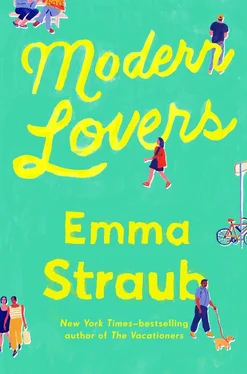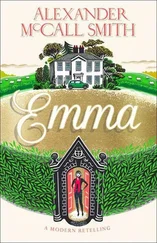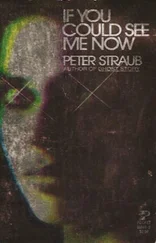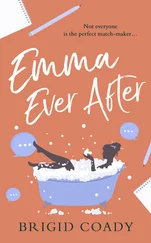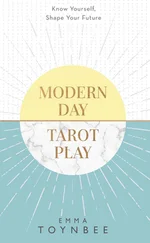Ruby made a little noise like a kazoo, her mother’s torpedo in reverse. It was funny, what parents did to their children. Even when they weren’t trying, everything got reproduced. She looked toward her mother, who nodded. “I really want to wear one of Mum’s dresses. The white one, you know?”
Elizabeth did know. Zoe was not only good at buying clothes, she was good at keeping them. It was lucky that she’d married a woman who wore the same blue jeans every day and a small rotation of button-down shirts, because there was no room in their giant walk-in closet for anything else. The white dress was a relic from their youth: a crocheted bodice that was more negative space than material, with a skirt made of dangling strings that started just below decent. It was the kind of dress one wore over a bathing suit while on vacation in Mexico in 1973. It had originally belonged to Zoe’s mother, which meant it probably had quaalude dust ground deep into the seams. Before she met the Bennetts, Elizabeth had never met parents that had the kind of life that made their children both proud and embarrassed simultaneously. Cool was good, but only up to a point.
“Wow,” Elizabeth said.
“It’s still under debate,” Zoe said.
Ruby rolled her eyes, and jumped down the final step just as the doorbell rang. Before their neighbors began to pour in, each one holding a dish covered with tinfoil, Ruby had streaked in and out of the kitchen and was running back upstairs with a plateful of food.
“Hiiiiiiiiiii,” three women trilled in union.
“Hiiiiiiiiiii,” Elizabeth and Zoe trilled back, their voices performing the song of their day, the enthusiastic cry of the all-female dinner party.
When Elizabeth was out at night, it was up to Andrew to feed Harry. Unlike most teenage boys, who would eat cardboard if it was topped with pepperoni, Harry had a delicate appetite. He ate around things like a toddler, piling up the rejects on one side of his plate: no olives, no avocado unless it was in guacamole, no cream cheese, no kale, no sesame seeds, no tomatoes except in tomato sauce. The list was long and evolved regularly — it seemed to Andrew that whenever he cooked, something new had been added. He pulled open the fridge and stared inside. Iggy Pop, their skinny calico, rubbed his body against Andrew’s shoe.
“Harry,” he said, turning his head toward the living room. He could hear the repetitive beeps and bloops of Harry’s favorite video game, Secret Agent. The game starred a frog in a trench coat and deerstalker cap and, as far as Andrew could tell, was made for eight-year-olds. Harry had zero interest in Call of Duty, or Grand Theft Auto, or any of the myriad other games that celebrated murder and prostitutes, and for that Andrew was glad. Better to have a son who liked frogs than automatic machine guns. Andrew himself had played gentle video games and read three-inch-thick fantasy novels about mice. They were two of a kind, he and Harry, soft on the inside, like underbaked cookies. It was what people always wanted, wasn’t it?
“Harry,” Andrew said again. He closed the refrigerator door and stood quietly. “Harry.”
The game noises stopped. “I heard you the first time, Dad,” Harry said. “Let’s just order a pizza.”
“You sure?”
“Why not?” The noises started again. Andrew pulled out his phone and walked through the doorway into the living room, Iggy following behind. It was still light outside, and for a moment Andrew felt sad, looking at his gentle son, so happy to stay indoors on a beautiful June evening. No solo penalty kicks in the park, no pickup basketball, not even any contraband cigarettes on a secluded bench. Harry looked pale — Harry was pale. He was wearing a snug black sweatshirt with the zipper pulled all the way up to his neck. “Want to play?” Harry asked. He looked up, his brown eyes shimmering, and then Andrew put his sadness away in a deep, deep pocket and sat down next to his son. Iggy Pop jumped onto his lap and curled up. The frog winked, and the music began.
It was someone’s job to write that music — a tinny little melody that played in the background on repeat. It was someone’s job to write the music that played behind actors’ dramatic pauses on soap operas. Cell-phone ringtones. Someone was getting paid, maybe even cashing royalty checks. Andrew had never been a very good bass player, but he had always been good at coming up with melodies. It was probably the only thing he’d ever really loved doing, professionally speaking, even though it was never exactly professional. Still, whenever he was feeling low, which was more often than not, Andrew would think about his own royalty checks, his and Elizabeth’s, and how they were paying for most of Harry’s tuition at private school, and it would cheer him up a little. There was always someone doing better, especially in New York City, but fuck it, at least he’d done something in his life, something that would be remembered.
“Dad,” Harry said, “it’s your turn. I’ll order the pizza.” Harry pushed the hair out of his eyes and blinked like a baby mole seeing sunlight for the first time. He was such a good kid, such a good kid . They talked about it all the time, ever since he was a baby — Andrew and Elizabeth would huddle together in bed, cozy and content, the baby monitor between them, listening to his coos and hiccups. He’d always been easy. Their friends all warned them that the next kid would be the doozy, here comes trouble, but the next one never came. And so it was just the three of them, steady as anything. At first people would ask why they’d had only one child, but the longer you went, the more people assumed it was by choice, and let it go. Even their parents had stopped asking by the time Harry was six. And who needed more grandchildren when Harry would climb into his grandmother’s arms and kiss her on the cheek without being prompted? Who could ask for more than that? Some people in the neighborhood — not really their friends, just people they waved at when they were taking out the trash — had three or four kids, and it always struck Andrew like something out of the last century, where you needed as many small hands as possible to milk the cows and hoe the fields. What did you do with that many kids in Brooklyn? Were their genes that good, that important to the human race? He understood when it was for religious reasons — the Lubavitchers up in Williamsburg, the Mormons in Utah — they were in it for the endgame. But he and Elizabeth? They were just doing their best, and their best was Harry, sweet Harry. Andrew half wanted him to bomb the SATs and live at home forever. But of course he’d ace those, too, thanks to the purple prose of the novels he loved. Even when he was a baby, Harry had loved multisyllabic words—“this is exTRAWdinary,” he said before he was two, about the fountain at Grand Army Plaza, which shot jets of water high into the air.
“Love you, buddy,” Andrew said.
Harry was staring into his phone, pushing buttons. “Ordered.”
Ruby hated the fucking SAT as much as she fucking hated high school. Both were examples of the patriarchy’s insistence on male domination and total sexist bullshit like that. Whitman was a good school by Brooklyn private-school standards — not the best, but not the worst. Maybe one kid would get into an Ivy, but maybe not. Most people would go to places like Marist or Syracuse or Purchase. But not Ruby. Ruby was taking a gap year. That was the polite way to put it. The truth was that she had gotten into exactly none of the five schools she’d applied to, and her falsely optimistic mothers were convinced it was her SAT scores that were to blame, not her bad attitude or bad grades or shitty essays about being a black Jew with lesbian moms (the essay that everyone incorrectly assumed she would write), and so she was going to have to take another prep course, the summer after her senior year. Who even did that? Nobody did that. It was a joke, and she was the punch line.
Читать дальше
